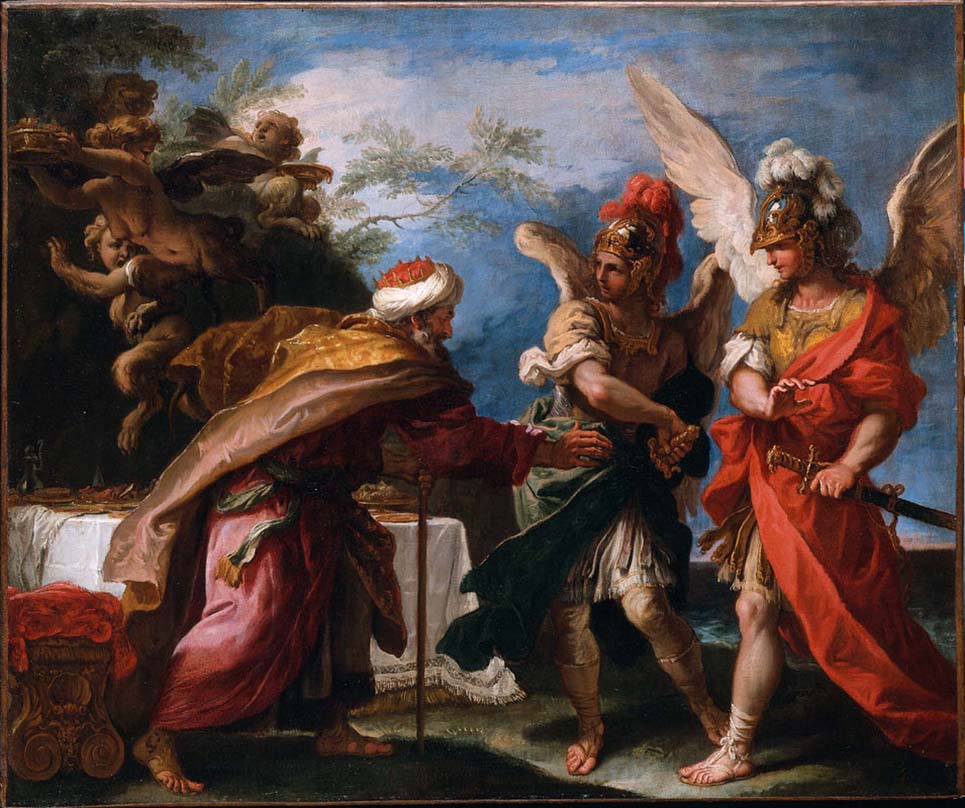Phineus
In Greek mythology, Phineus (Ancient Greek: Φινεύς) was a king of Salmydessus in Thrace and seer who appears in accounts of the Argonauts' voyage. Some accounts make him a king in Paphlagonia or in Arcadia.
Family
The parentage is uncertain, with three different fathers commonly named.
The most common parentage of Phineus is given as Agenor, King of Phoenicia, which would make Phineus a brother to Cadmus and Europa.
Alternatively, Phineus is a son of Phoenix, son of Agenor, born to the daughter of Arabius, Cassiopea; or he is the son of the Greek sea god Poseidon, by a woman unnamed.
In the event that Phineus was the son of Agenor, or of Phoenix, then this would make Phineus a long lived individual, for both of these potential fathers lived generations prior to the events of which Phineus is most famous.
Phineus would become known as a king of Thrace, where he ruled Salmydessus; to the Ancient Greeks, Thrace was a name given to the land north of Thessaly.
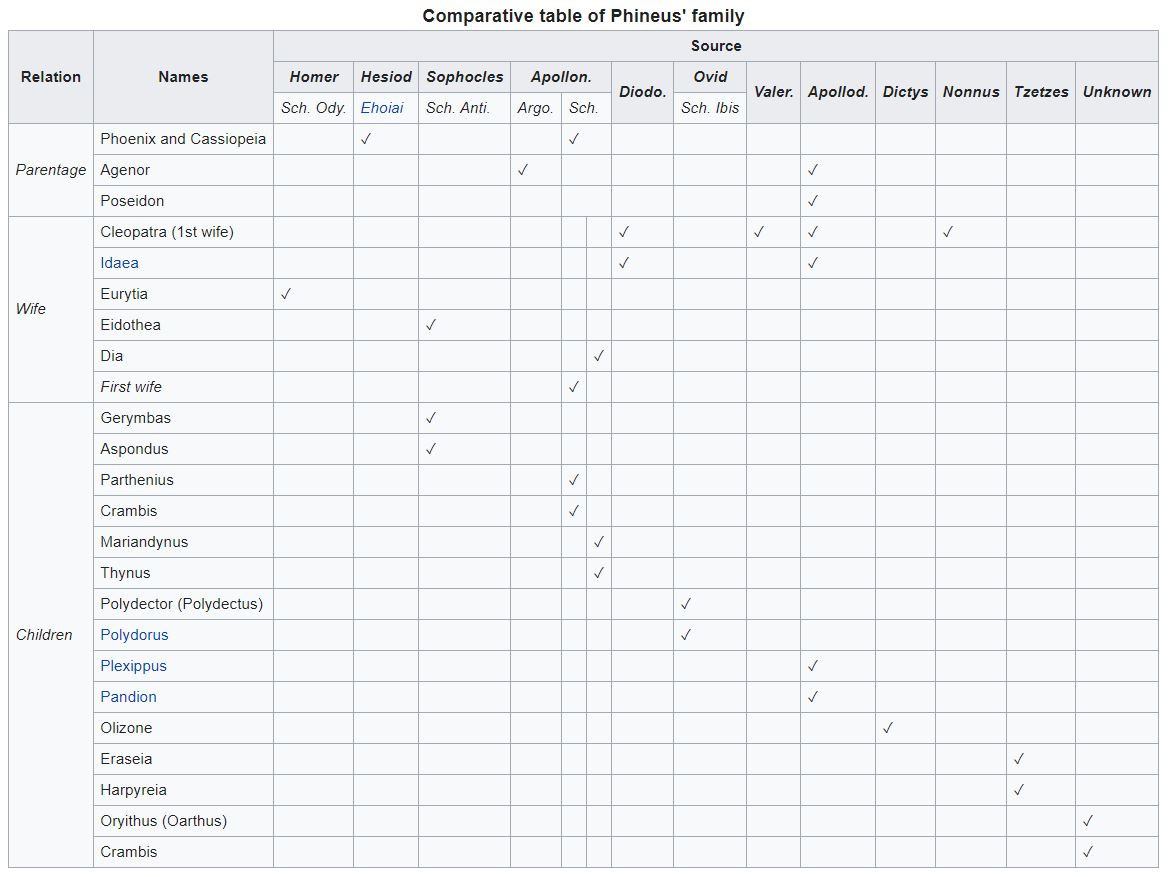
The Blinding of Phineus
In the simplest versions of the tale of Phineus, Apollo teaches Phineus the art of prophecy, and so Phineus becomes known as a seer, as well as a king.
Phineus though misuses his gifts, for he reveals too much to mankind, for seers were expected not to be too precise, or too clear, in their prophecies, lest they revealed the secrets of the gods. Phineus, for his indiscretion, is made blind by Zeus, and then as an additional punishment, the Harpies were sent to further torture the Thracian king.
The Harpies were the monstrous winged women of Greek mythology, known as people snatchers, who worked in partnership with the Erinyes.
The form of torture undertaken by the Harpies upon Phineus saw the winged women swoop down upon and food laid out for the king, taking most and leaving only uneatable remains behind.

A member of the Argonauts
This torture of Phineus would continue, until the arrival of the Argo upon the shores of Thrace.
Amongst the Argonauts were Calais and Zetes, brothers who were collectively known as the Boreads, for they were sons of the Anemoi Boreas. This made them relations to Phineus as well, for Phineus was said to have been wed to Cleopatra, a daughter of Boreas and Oreithyia.
When he heard the Argonauts coming, Phineus called upon the band of heroes to rescue him, telling Jason and his men that Calais and Zetes were destined to free him from his torture. The Boreads were initially reluctant to go against the will of the gods, but Phineus would reassure them that they would not be punished themselves for stopping the torment.
Thus it was that when the Harpies next came down to steal Phineus’ food, the Boreads took off after them. Calais and Zetes had inherited a special gift from their father, for these two sons of Boreas had the ability to fly. The Boreads would chase the Harpies as far as the Strophades Islands, where upon the goddess Iris intervened to prevent harm to her sisters.
Thus it was that the Argonauts had delivered Phineus from his torment, and in gratitude the seer now told Jason and his men the route to Colchis. This route took the Argo through the Symplegades, the Clashing Rocks, and near to the island of Aretias, where the Stymphalian birds were to be found.
Phineus told Jason how the Argo might safely navigate between the Symplegades, if the Argonauts rowed with all their might after a dove, and how the Stymphalian birds might be dispersed if a great noise was made with the shields and weapons of the warriors.
Alternative Tales of Phineus
The story of Phineus in Greek mythology becomes far more complicated if the blindness of the king of Thrace is not put down to revealing the secrets of the gods; and subsequently, Phineus becomes much less of a sympathetic character.
One tale tells of Phineus choosing a long-life over the ability to see, claiming to prefer to live for many years than to look upon the sun again. The sun god Helios though, took this as an insult to him, and so it was Helios who dispatched the Harpies to torment Phineus.
Or, perhaps, the blinding of Phineus was due to some other punishment of the gods.
The Family of Phineus
It has already been mentioned that Phineus was married to Cleopatra, the daughter of Boreas; and this marriage was said to have brought forth two sons for Phineus, with these sons commonly named Plexippus and Pandion.
Cleopatra though, was only the first wife of Phineus, for Phineus would leave Cleopatra and make Idaea, daughter of King Dardanus of Scythia his new wife.
Phineus also had other children by unnamed women, including Thynus and Mariandynus, and Olizone.
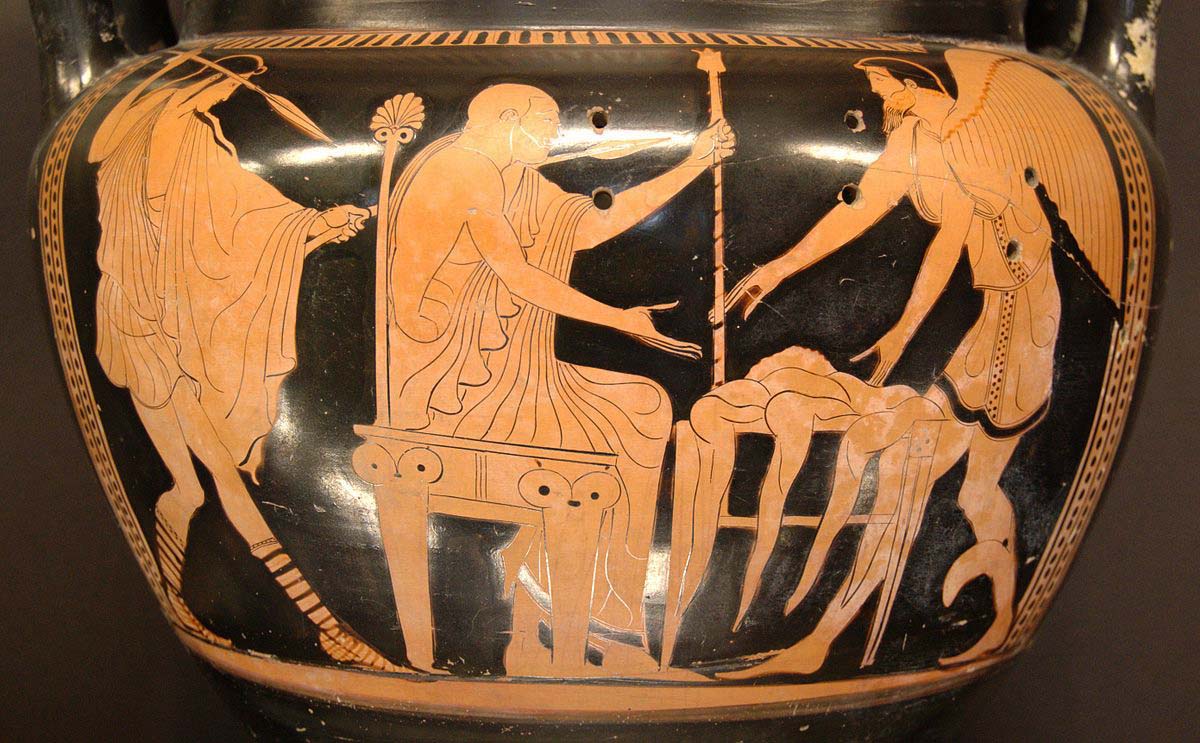
Family trouble for Phineus
As was common in tales of Greek mythology the second wife of an individual was often jealous of the first, and Idaea was no exception.
Idaea would claim that Plexippus and Pandion had attempted to rape her, and believing his new wife, King Phineus punished his sons.
Some tell of Phineus killing his sons, in which case the gods punished him with blindness, or else threw them, and potentially Cleopatra, into a prison cell, and tortured them, in which case Phineus kept his sight.
The demise of Phineus
In the latter case, when the Argonauts arrived they discovered the unjust punishment being undertaken, and they went to Phineus to talk about releasing them. Phineus though was angered about strangers interfering in his kingdom’s affairs, and bluntly refused to release them. In response, Calais and Zetes rushed to release their nephews from their imprisonment.
Phineus now organised his army to deal with Calais and Zetes, but of course, the other Argonauts sided with their comrades, and a battle ensued between the Argonauts and the Thracians. In this battle it was said that Phineus was killed by Heracles, and of course the Argonauts emerged victorious.
Idaea was expelled from the country and the sons of Phineus, Pleippus and Pandion, now became rulers of Salmydessus.
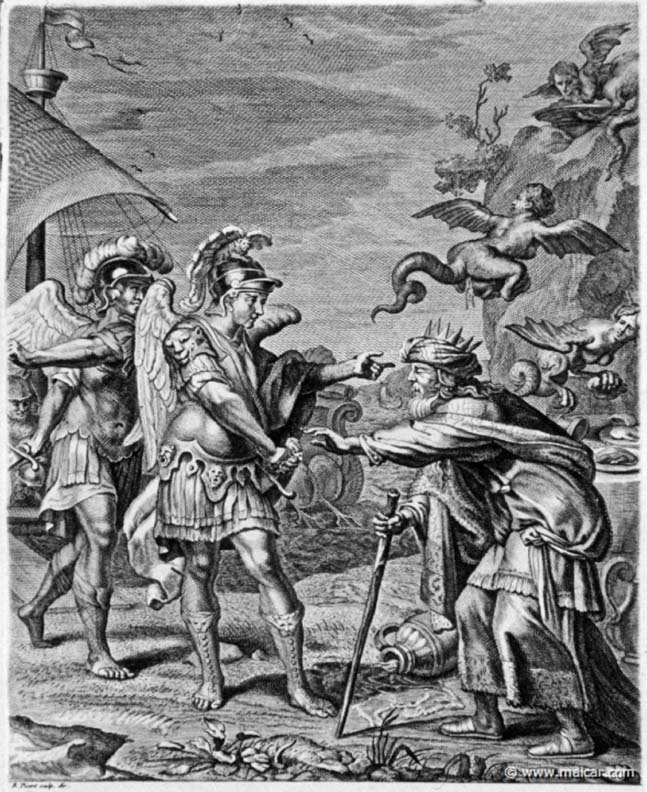
The name Phineus in Greek Mythology
In Greek mythology, Phineus (Ancient Greek: Φινεύς) was the name of the following figures:
Phineus, king of Thrace who was visited by Jason and the Argonauts (as described above).
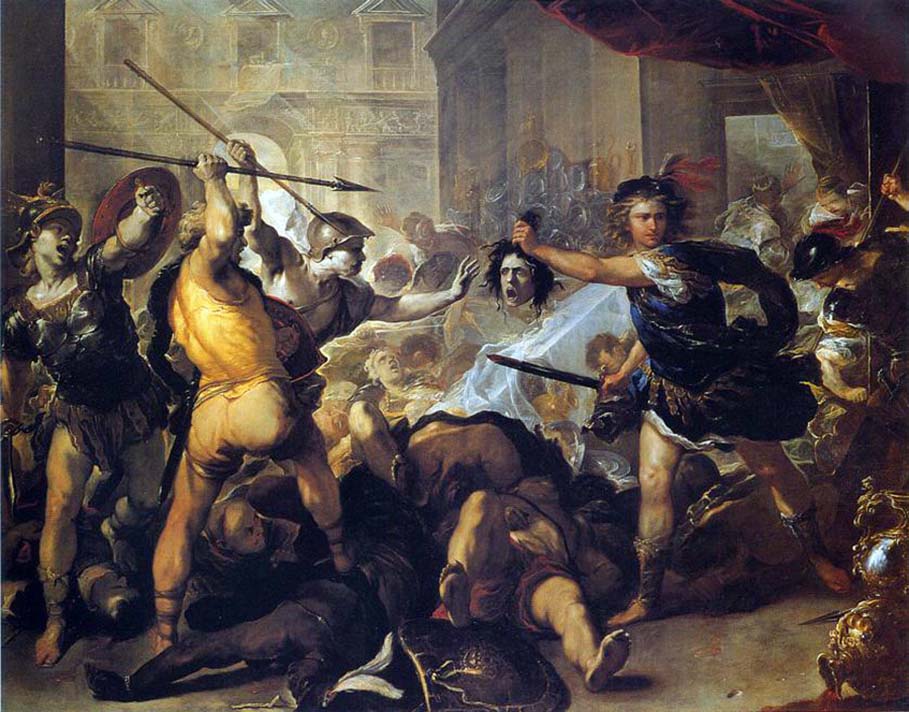
Phineus, son of Belus who was turned to stone by Perseus.
In Greek mythology, Phineus was a son of Belus by Anchinoe and thus brother to Aegyptus, Danaus and Cepheus.
Phineus is most commonly said to be a son of Belus, King of Libya born to the Naiad Anchinoe. The most famous sons of Belus were Danaus and Aegyptus, the famous fathers of 50 daughters and 50 sons. Later writers would add two further sons in the form of Cepheus and Phineus.
Cepheus would become ruler of Aethiopia, the land south of the Sahara, where he would wed Cassiopeia and become father to Andromeda. Phineus would be just a member of the royal family, but he had his eyes on the throne of Aethipoia, especially as Cepheus had no son to inherit it.
To further cement his position as heir to the throne of Aethiopia, Phineus also ensure that he was betrothed to Andromeda.
As stated, Phineus had been engaged to Cepheus' daughter Andromeda before she wed Perseus, and Phineus plotted against him, leading Perseus to turn him and his co-conspirators into stone by showing them the head of Medusa. The affair appears to have formed part of Euripides' lost Andromeda, but the sole extensive ancient treatment is found Ovid's Metamorphoses.
In Ovid's account Perseus asked for Andromeda's hand in return for saving the girl from the sea-monster Cetus to whom an oracle had ordained Andromeda be sacrificed as punishment for her mother Cassiopeia's boast that she was more beautiful than the Nereids. Perseus was successful, but as he recounted his deeds to the court of Cepheus a spear-brandishing Phineus assailed him.
Phineus' presumed motive in marrying Andromeda was to strengthen his claim to the throne, rather than any interest in the girl herself. Cepheus scolded his brother for this outburst, pointing out that he had done nothing to help Andromeda in the crisis, but Phineus still cast his spear at Perseus.
Although he missed, a fierce battle ensued in which many fell until Perseus, surrounded by the enemy, held up the head of the Gorgon, turning all but Phineus to stone. Amazed by this, Phineus pleaded for his life with his gaze averted, but Perseus approached him and held the head before his eyes, turning Phineus to stone.

Phineus, one of the sons of Lycaon.
Based on Apollodorus catalogue, Phineus was one of sons of Lycon; who due to his disrespect to the gods of trying to serve them human flash was transformed into a Lycan – aka, werewolf (for more details see "Lycanthrope" under the section of "legendary monsters").
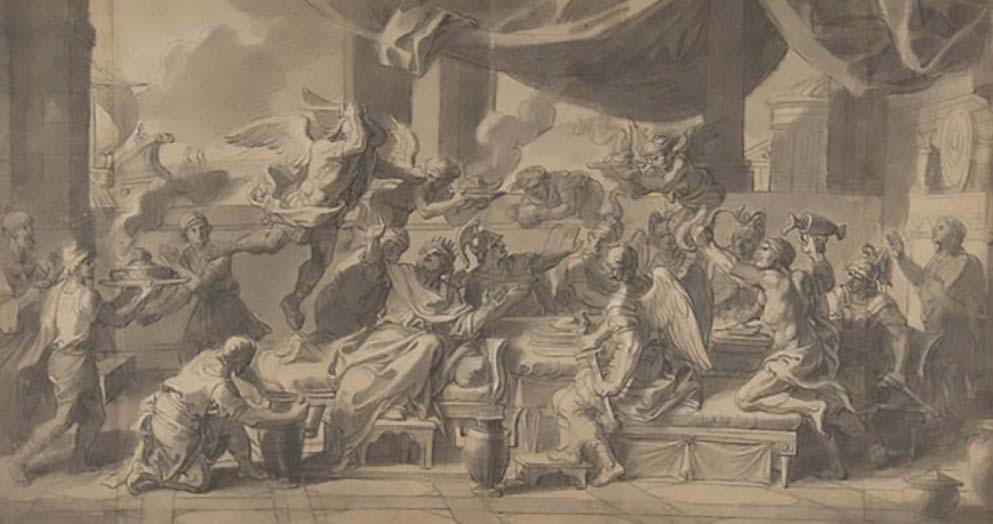
Sources
Scholia on Apollonius of Rhodes, Argonautica 2.178, 237; Scholia ad eund 2.177
Pseudo-Apollodorus, Bibliotheca 1.9.21
Eustathius ad Homer, Iliad 2.851, ad Dionysius Periegetes, 787
Stephanus of Byzantium, Ethnica s.v. Constantine Porphyrogennetos, De thematibus 1.7
William Smith. Dictionary of Greek and Roman Geography, sv Paphlagonia
Servius, Commentary on Virgil's Aeneid 3.209
Apollonius of Rhodes, Argonautica 2.236–7
Hesiod, Ehoiai fr. 138 (Merkelbach & West 1967)
Scholia on Apollonius of Rhodes, Argonautica 2.178
Phineus was the grandson of Agenor as the son of Phoenix according to Pherecydes and Antimachus as cited in George W. Mooney, Commentary on Apollonius: Argonautica vs Phineus
Pseudo-Apollodorus, Bibliotheca 3.15.3
Scholia on Sophocles, Antigone 977 ed. Brunck
Scholia on Ovid, Ibis 273
Scholia on Apollonius Rhodius, Argonautica 2.140
Tripp, s.v. Dardanus (2) p. 190
Diodorus Siculus, Bibliotheca historica 4.43.3–4
Pseudo-Apollodorus, Bibliotheca 3.15.3
Scholia on Sophocles, Antigone 989
Scholia on Homer, Odyssey 12.69
Sophocles, Antigone 966–76
Tzetzes, Chiliades 1.220
Tzetzes on Lycophron, Alexandra 166
Dictys Cretensis, Trojan War Chronicle 3.5 & 4.22
Sophocles fr. 704 Radt
Megalai Ehoiai fr. 254 (Merkelbach & West 1967).
Hesiod, Ehoiai fr. 157 (Merkelbach & West 1967)
Apollonius of Rhodes, Argonautica 2.178–86
Phineus' food: Apollonius of Rhodes, Argonautica 2.187–201; his wandering torment: Hesiod, Ehoiai fr. 157 (Merkelbach & West 1967)
Dräger (2007).
Orphic Argonautica, 674
Scholia ad Pindar, Pythian Odes 13.96
Apollonius of Rhodes, Argonautica 2.234–9
Apollonius of Rhodes, Argonautica 2.244–61
Apollonius of Rhodes, Argonautica 2.263–72
Apollonius of Rhodes, Argonautica 2.282–7
Apollonius of Rhodes, Argonautica 2.288–97
Pseudo-Apollodorus. Bibliotheca, 1.9.21
Bibliotheca 2. 1. 4
Pseudo-Apollodorus. Bibliotheca, 3.8.1
Bibliotheca 2. 4. 3.
Metamorphoses 5. 1–235.
Ovid, Met. 4. 663–705.
Met. 5. 10–12, trans. A. S. Kline.
Met. 5. 200–49
"Wikipedia"
"Greek Legends and Myths"


